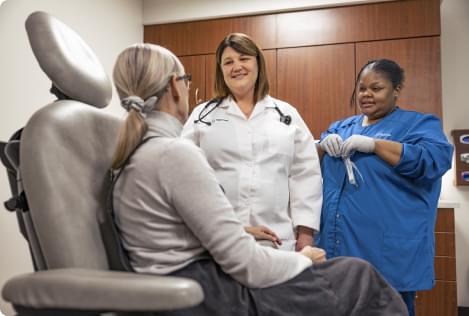| Study Name | Description | Trial Category | Trial SubCategory |
|---|---|---|---|
| BACKBEAT Study | The purpose of this study is to evaluate the effectiveness and safety of a new pacemaker program called Atrioventricular Interval Modulation (AVIM) in patients who are schedule to have, or recently received, a pacemaker. | Heart & Vascular | Hypertension |
| Easi-HF Preserved | The purpose of this study is to evaluate efficacy and safety of the combined use of oral Vicadrostat (BI 690517) and empagliflozin compared with placebo and empagliflozin in participants with symptomatic heart failure (HF: NYHA II-IV) and left ventricular ejection fraction (LVEF) >= to 40% | Heart & Vascular | Atrial Fibrillation |
| QDOT | The purpose of this study is to evaluate the long-term safety and effectiveness of the QDOT Micro system use in conjunction with Visitag Surpoint Module for the treatment of symptomatic drug refractory Paroxysmal Atrial Fibrillation. | Heart & Vascular | Atrial Fibrillation |
| Basic | The purpose of this study is to test if different mobile or wearable devices can measure how much time a person's heart is in atrial fibrillation over a period of 4 months. | Heart & Vascular | Atrial Fibrillation |
| Librexia ACS | The purpose of this study is to see if an experimental drug, called milvexian is safe, effective and useful in reducing risk of developing blood clots, stroke, or another heart attack among subjects with a recent heart attack or angina (chest pain) episode. An experimental drug is one that is not approved by the United States Food and Drug Administration (FDA). | Heart & Vascular | Atrial Fibrillation |
| Librexia AF | The purpose of this research study is to compare the effects of an experimental drug, milvexian, to the comparator drug, apixaban, to determine if it is safe and useful in reducing the risk of stroke and blood clots outside the brain (non-central nervous system (CNS) systemic embolism) in participants with atrial fibrillation. | Heart & Vascular | Atrial Fibrillation |
| ANT-010/Lilac | A study to evaluate the effect of the experimental drug abelacimab relative to placebo in subjects with atrial fibrillation/flutter (AF) who are not treated with oral anticoagulants because they have been deemed by their responsible physicians or by their own decision to be unsuitable for currently available oral blood thinners. | Heart & Vascular | Atrial Fibrillation |
| Amgen Ocean(a) | The primary objective of this study is to compare the effect of treatment with olpasiran, to placebo, on the risk for coronary heart disease death (CHD death), myocardial infarction, or urgent coronary revascularization in participants with atherosclerotic cardiovascular disease (ASCVD) and elevated Lipoprotein(a). Patients must have a Lp(a) value of ≥ 200 nmol/L during screening. | Heart & Vascular | Cardiovascular Disease |
| Complete TAVR | The purpose of this study is to determine whether restoring blood flow to all blocked or narrowed arteries via percutaneous coronary intervention (PCI) using coronary stents is better than treating the coronary artery disease (CAD) with medications in patients with CAD who had successful transcatheter aortic value replacement (TAVR) with a balloon expandable heart valve. The study will also compare measurements of hemodynamics (blood flow and blood pressure) that are taken during on-table procedures (TAVR and PCI) with those taken by echocardiography (heart ultrasound). | Heart & Vascular | Cardiovascular Disease |
| Node X | Participants must have participated in a prior study with the investigational drug etripamil (the NODE-301, NODE-302, or NODE-303 study). The study is being done to determine the safety of etripamil 70 mg for the treatment of multiple episodes of PSVT in an at-home setting. | Heart & Vascular | Cardiac Arrhythmia |
| PPP/PAN/PSR | This study is a registry study. The purpose is to collect information over time about how Medtronic products are working and/or the outcome of the treatment. The registry will be used to support post-market surveillance activities and post-approval studies (e.g., to collect safety and performance information). In addition, it will be used to obtain clinical evidence for the development and improvement of medical devices, therapies, device guidelines, patient services/solutions and provide clinical data to support health economics and clinical outcomes research. The registry is not an experimental clinical study. | Heart & Vascular | Cardiac Arrhythmia |
| Arrhythmia Detection After Myocardial Infarction (AID-MI) | This study will evaluate the use of an insertable cardiac monitor in patients following an acute myocardial infarction (heart attack) to determine if cardiac monitoring results in more rhythm-related findings that change management compared to standard of care post heart attack management in patients who do not receive the insertable cardiac monitor. | Heart & Vascular | Cardiac Arrhythmia |
| CREST 2 LOE | Long-Term Observational Extension of Participants in the CREST-2 Randomized Clinical Trial (C2LOE) | Heart & Vascular | Carotid Stenosis |
| Real AF | Real-world Experience of Catheter Ablation for the Treatment of Symptomatic Paroxysmal and Persistent Atrial Fibrillation Using Novel Contact Force Technologies: REAL AF Registry | Heart & Vascular | Atrial Fibrillation |
| Champion AF | The primary objective of this study is to determine if left atrial appendage closure with the WATCHMAN FLX device is a reasonable alternative to non-vitamin K oral anticoagulants in patients with non-valvular atrial fibrillation. | Heart & Vascular | Atrial Fibrillation |
| Crest 2 | The main purpose of the study is to find out if the incidence of stroke or death is different or the same between subjects that receive medical management alone compared to subjects that receive medical management in combination with carotid endarterectomy (CEA) or carotid artery stenting (CAS). | Heart & Vascular | Carotid Stenosis |
| PFO Occulder (PAS) | The purpose of this research study is to evaluate the commercially available AmplatzerTM PFO Occluder and AmplatzerTM TalismanTM PFO Occluder in preventing another stroke by closing patients patent foramen ovale (PFO). | Heart & Vascular | Structural Heart Disease |
| Portico NG | This is a study of an updated Portico Valve for TAVR. | Heart & Vascular | Structural Heart Disease |
Unsupported Browser! This website will offer limited functionality in this browser. We only support the recent versions of major browsers like Chrome, Firefox, Safari, and Edge.


